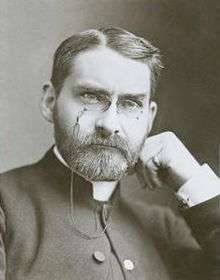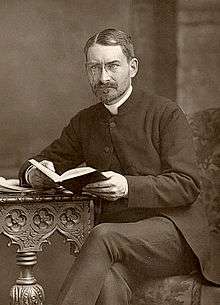Hugh Price Hughes
Hugh Price Hughes (9 February 1847 – 17 November 1902) was a Welsh Protestant clergyman and religious reformer in the Methodist tradition. He served in multiple leadership roles in the Wesleyan Methodist Church. He organised the West London Methodist Mission, a key Methodist organisation today. Recognised as one of the greatest orators of his era, Hughes also founded and edited an influential newspaper, the Methodist Times in 1885. His editorials helped convince Methodists to break their longstanding support for the Conservatives and support the more moralistic Liberal Party, which other Nonconformist Protestants were already supporting.
Hugh Price Hughes | |
|---|---|
 | |
| President of the Methodist Conference | |
| In office 1898–1899 | |
| Preceded by | William L Watkinson |
| Succeeded by | John Edward Radcliffe |
| Personal details | |
| Born | 9 February 1847 Carmarthen, Wales |
| Died | 17 November 1902 (aged 55) London |
| Nationality | British |
| Occupation | Wesleyan Methodist Church Superintendent of the West London Methodist Mission |
Biography

Hughes was born in Carmarthen, and was educated at Richmond Theological College and University College London. His sister was the teacher Elizabeth Phillips Hughes.[1] He married Katherine Hughes (née Barrett). In 1885, he founded the Methodist Times, and in 1887 he was appointed Superintendent of the West London Methodist Mission. His wife Katherine organised and led the innovative Sisters of the People, social work volunteers attached to the West London Mission. In 1896, he was elected first president of the National Council of Evangelical Free Churches, an organisation he helped create. In 1898, he was elected President of the Wesleyan Methodist Conference for a year-long term. He died at his home in London following a stroke.[2][3]
Hughes rose as the leader of the "Forward Movement" in Methodism, which sought to reshape the Methodist Church as the moral and social conscience of Britain. Later, he extended this idea to the Nonconformist Free Churches as a whole. He was concerned that the non-Anglican evangelical tradition had become overly focused on individual salvation, and it was time for Methodists, Baptists, Congregationalists, Presbyterians and Quakers to become churches in a fuller sense, taking on responsibility for the salvation of society.[4] These ideas were expressed in his published sermons. In his first book of sermons, entitled Social Christianity, he declared "It is because the spirit of Christ has not been introduced into public life that Europe is in a perilous condition today. . . My wish is to apply Christianity to every aspect of life."[5]
As a reformer, Hughes was a leader for temperance and for the repeal of the Contagious Diseases Acts. He was also a strong advocate for public, non-sectarian education and international peace. He strongly supported Gladstone's Irish Home Rule Bills. After the Irish nationalist leader Charles Stewart Parnell was revealed to have committed adultery with Katherine O'Shea, Hughes declared that English Nonconformists would no longer support the Irish cause if its leader was a proven adulterer. This threat led Gladstone to state that he could not remain as Liberal leader if Parnell continued to lead the Nationalists, thus precipitating the Parnell Split.
Hughes played a key role in leading Methodists into the Liberal Party coalition, away from the Conservative leanings of previous Methodist leaders.[6][7]
Family
On 20 August 1873, he married Mary Katherine Howard, daughter of the Rev. Alfred Barrett, governor of Richmond Theological College; they had two sons and two daughters.[8]
Associated Activists in Social Change
- Emmeline Pethick-Lawrence
- Mark Guy Pearse
- Henry Simpson Lunn
- Charles Albert Berry
- Percy William Bunting
- John Greener Hallimond.
According to "A Countess at the Bowery Mission: The Christian Herald And Signs Of Our Times", 20 December 1899, page 987: "Nine years ago, he [Hallimond] was connected with the great West London Mission, England, of which Rev. Hugh Price Hughes is Superintendent." This is repeated in "Great Heart of the Bowery: Leaves from the Life-Story of John G. Hallimond,late Superintendent of the Bowery Mission," Fleming H. Revell, NY: 1925. In the biographical forward by George H. Sandison of Christian Herald, "Nine years before he came to America he was connected with the great West London Mission, of which Rev. Hugh Price Hughes was Superintendent" (page 13).
References
- Honourable Society of Cymmrodorion (London, England) (1995). The Transactions of the Honourable Society of Cymmrodorian. The Society. p. 135.
- The history of the West London Mission Archived 7 September 2011 at the Wayback Machine. Alan Brooks, West End Methodism: The Story of Hinde Street. London: Northway Publications, 2010.
- History. wlm.org.uk
- Christopher Oldstone-Moore, Hugh Price Hughes: Founder of a New Methodism, Conscience of a New Nonconformity (Cardiff, 1999), 137-38.
- Hugh Price Hughes, Social Christianity 3rd ed. (New York, 1890), 21-3.
- Maldwyn Lloyd Edwards, Methodism and England: a study of Methodism in its social and political aspects during the period 1850-1932 (The Epworth Press), p. 149.
- John F. Glaser, "English Nonconformity and the Decline of Liberalism," American Historical Review, (1958) 63#2 pp. 352-363 at p 356 in JSTOR
-
